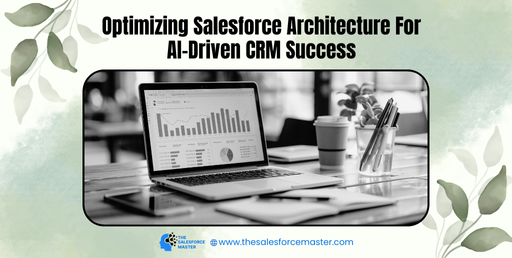
Optimizing Salesforce Architecture for AI-Driven CRM Success
AI integration in Customer Relationship Management (CRM) is transforming how businesses leverage data. To fully benefit from AI, companies must optimize their Salesforce architecture strategically. By enhancing core structures, you ensure smooth performance, scalability, and actionable insights.
Enhancing Data Quality and Integration
Effective AI relies on accurate and clean data. Therefore, maintaining high-quality data is crucial for success. Implement robust Salesforce Login security to ensure secure data access. Use data validation rules, duplicate management tools, and proper field mapping to maintain data integrity.
Integrating external data sources enhances the AI capabilities of Salesforce. With Salesforce Data Loader, importing large datasets becomes seamless. Additionally, using Salesforce Marketing Cloud for audience segmentation provides detailed customer insights, crucial for AI-driven predictions.
Key tools include:
- Salesforce Marketing Cloud Connect for seamless data integration.
- Salesforce Data Management to handle large-scale data processing.
Leveraging Automation with AI
Salesforce’s AI, Einstein Analytics, empowers automation for repetitive tasks. Implement Salesforce Flow Builder to streamline processes, reducing manual effort. Moreover, Einstein AI’s predictive analytics offer real-time recommendations. These insights improve customer engagement strategies in Salesforce Marketing Cloud Journey Builder.
Automation tools such as Salesforce Apex enhance AI-driven workflows. They allow for customizing logic to meet unique business needs. With Salesforce Marketing Automation, you can optimize campaigns based on AI insights, increasing ROI significantly.
Transitioning from manual processes to AI-driven automation improves:
- Lead scoring through Einstein Lead Scoring.
- Personalization in Salesforce Marketing Cloud campaigns.
Building a Scalable Infrastructure
Scalability is essential when integrating AI into your Salesforce architecture. Use Salesforce Sandbox for testing new features without affecting production environments. Employing Salesforce DevOps tools ensures smooth deployments, reducing system downtime.
A scalable system benefits from optimized Salesforce Marketing Cloud Audience segmentation. This ensures personalized marketing at scale. Implement Salesforce Shield to maintain compliance and security, particularly for large datasets.
Key scalability considerations include:
- Efficient data storage using Salesforce Data Architecture.
- Performance monitoring with Salesforce Performance Analyzer.
Conclusion
Optimizing Salesforce architecture for AI involves enhancing data quality, leveraging automation, and ensuring scalability. With tools like Salesforce Login, Marketing Cloud, and Einstein Analytics, businesses can maximize CRM success. By focusing on these strategies, you empower your organization to harness the full potential of AI-driven insights, driving customer engagement and operational efficiency.


